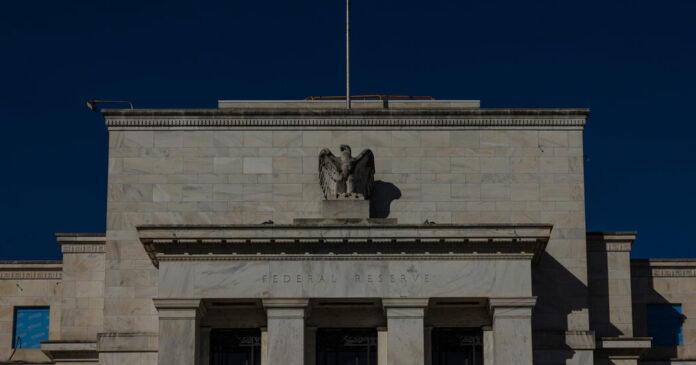The Federal Reserve said on Friday that it had withdrawn from a network of global financial regulators focused on climate change risks just days before President-elect Donald J. Trump returns to power.
The central bank formally joined the Network of Central Banks and Supervisors for Greening the Financial System in December 2020, shortly after President Biden was elected. Democrats praised that decision, arguing that regulators needed to make sure financial institutions were adequately managing the risk they faced from extreme weather events.
Republican lawmakers, however, immediately blasted the Fed for joining the network, saying the central bank was overstepping its congressional mandate, which requires it to keep inflation stable and the job market strong. They expressed concern that the Fed, which oversees the nation’s biggest banks, might try to discourage financial institutions from lending to oil, gas and coal producers or other fossil fuel-intensive companies.
The Network of Central Banks and Supervisors for Greening the Financial System, or N.G.F.S., was formed to help central banks and other regulators exchange ideas and research as they figure out how to account for climate-related risks in the financial sector. The network also aims to “mobilize mainstream finance to support the transition toward a sustainable economy.”
While the Fed initially supported the network’s goals, the central bank said in a statement on Friday, it decided to leave after the group’s work “increasingly broadened in scope, covering a wider range of issues that are outside of the board’s statutory mandate.”
The decision was not unanimous. Five of the seven governors on the Fed’s board voted to withdraw from the network, including the Fed’s chair, Jerome H. Powell. Adriana Kugler and Michael S. Barr abstained. Mr. Barr recently announced that he would step down from his role as vice chair for supervision by Feb. 28.
The network said it “regrets but respects” the Fed’s decision to depart its “coalition of the willing.”
Yann Marin, the network’s secretary general, wrote in an email that it was true that the scope of the group’s work had broadened “as our understanding of the financial stability risks stemming from climate and nature events has improved.” He added that its work was driven only by financial risks and their consequences for financial and price stability.
The network was created in December 2017, months after Mr. Trump announced, during his first term as president, that the United States would withdraw from the Paris climate accord.
“We are facing political headwinds again, and the work of those traditional international organizations is becoming more difficult,” Mr. Marin said. “The N.G.F.S. will lead the way fulfilling its mandate, despite the bumps in the road.”
The Fed’s move to join the network was a seen as a sign of the central bank’s recognition that it had to begin taking into account the impact of extreme weather events as they occurred more frequently and posed a greater risk to the financial system. The Fed had been informally participating in the network for more than a year.
Republicans have sharply critiqued the central bank’s increased attention to climate-related risks in recent years, accusing the Fed of “climate activism.” Days before the Fed formally joined the network, a group of Republican lawmakers expressed concerns about the Fed’s involvement with the group. Its recommendations “could significantly limit access to capital for crucial industries and place harmful restrictions on regulated entities,” the lawmakers wrote in a letter to Fed officials in December 2020.
In contrast to the European Central Bank, which has embraced a role in the transition to a low-carbon economy, Mr. Powell himself has long maintained that dealing with climate is the responsibility of Congress, not the Fed.
In November, the Fed refused to back a plan designed by the Basel Committee on Banking Supervision, a global financial standard-setter that includes the world’s largest central banks, that would have pushed lenders to disclose the climate risk in their portfolios. In 2021, Fed staff wrote that “a lack of transparency around climate-related risks can increase vulnerabilities related to asset valuations, financial and non-financial leverage, and contagion risk.”
News of the Fed’s decision to leave the network was met with dismay from experts on the relationship between climate change and the financial system. Lisa Sachs, director of Columbia University’s Center on Sustainable Investment, noted that membership did not compel the Fed to take actions outside its statutory mandate.
“The Fed’s withdrawal reflects a growing trend of U.S. retreat from positions of leadership and cooperation in multilateral fora, sidelining the U.S. and ceding leadership to other nations that will take up the mantle,” Ms. Sachs wrote in an email.
Sarah Bloom Raskin, a former Fed governor, called the move “both substantively and symbolically significant.”
“Withdrawing Fed participation from the climate conversation among the world’s central bankers further undermines our country’s prospects for assessing and managing climate risk without having our ideological blinders on,” Ms. Raskin wrote in an email. “The symbolism of this move at the beginning of 2025 is ominous.”
